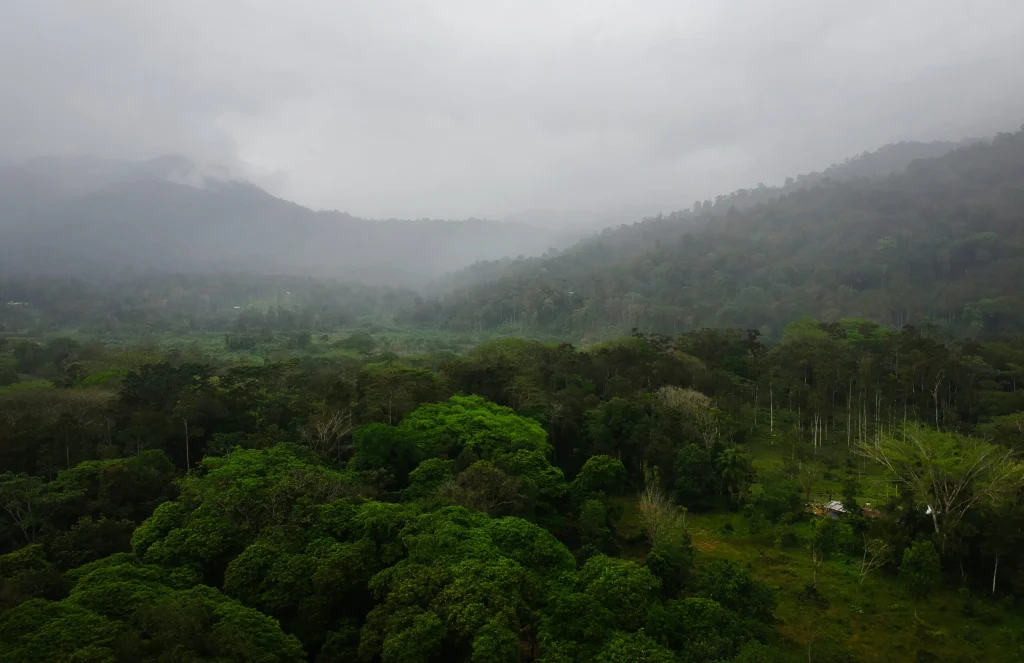This impact story was originally published by the Environmental Defense Fund here.
The clock is ticking to halt and reverse deforestation so that we avoid the worst impacts of climate change. The good news is that companies can provide the finance needed to keep the world’s forests standing by purchasing high-quality emissions reductions credits from large-scale tropical forest conservation programs, otherwise known as jurisdictional REDD+ (JREDD+).
In a jurisdictional scale approach to REDD+, a country, state, province or Indigenous territory has the authority to issue credits for forest carbon emissions reductions and removals. Due to the large scale at which they operate, JREDD+ programs have distinct and intrinsic features that enable them to meet key tenets of environmental and social integrity. JREDD+ programs can:
- Address leakage, additionality, and permanence issues as baselines to measure emission reductions and removals cover an entire jurisdiction. This accounts for potential shifts in emissions in that area and helps reduce the risk of reversals;
- Meet key principles of social integrity, such as including Indigenous Peoples and local communities as active partners, not just beneficiaries, and ensuring equitable and transparent benefit sharing; and
- Create incentives for improved governance, needed policy reforms, and large-scale implementation that lead to enduring systemic changes that are hard to undo.
Through purchasing high-quality credits from JREDD+ programs as part of their beyond value chain mitigation (BVCM) strategies, companies can make strides toward meeting their own climate goals, while helping support the livelihoods of Indigenous Peoples and local communities and sustain biodiversity. Companies should consider following the Tropical Forest Credit Integrity (TFCI) Guide to identify high-quality credits from jurisdictional-scale REDD+ programs, including fully-nested projects, and ensure their carbon credit purchases are having the highest social and environmental impact.
Companies should also note that momentum for JREDD+ is growing.
Ghana and Costa Rica sign landmark agreements with the LEAF Coalition: At COP28, the governments of Costa Rica and Ghana signed emission reduction payment agreements (ERPAs) with Emergent to supply high-integrity JREDD+ credits to buyers of the LEAF Coalition – a partnership of forest governments, the private sector, donor governments, Indigenous Peoples and local communities and civil society aiming to halt deforestation by 2030 through financing large-scale tropical forest protection. These agreements provide proof of concept for jurisdictional REDD+ programs, both demonstrating the potential to mobilize public and private funding at scale to tackle deforestation and proving that tropical forest countries are able and willing to meet high standards for jurisdictional-scale crediting.
Increasing alignment with emerging policies and frameworks: The jurisdictional approach to crediting tropical forest emissions reductions and removals, which aligns with the REDD+ framework under the United Nations Framework Convention on Climate Change (UNFCCC), is accepted by the International Civil Aviation Organization’s (ICAO) Carbon Offsetting and Reduction Scheme for International Aviation (CORSIA) and is being adopted by other sectors (e.g., Energy Transition Accelerator).
Jurisdictional REDD+ Technical Assistance Partnership (JTAP) launches: In December 2023, Environmental Defense Fund and partners launched the JTAP to help forest countries overcome key technical barriers to implementing high-integrity jurisdictional REDD+ programs in order to access carbon market finance. The JTAP will provide vital access to timely technical assistance to address transaction, audit, implementation, and issuance readiness needs. The JTAP is uniquely designed to foster deep collaboration and capacity building in service of and alongside leading local civil society organizations, IP and LC organizations, and forest country governments.
Introduction of new mechanism for upfront financing: Implementing large-scale forest conservation programs to generate high-quality tropical forest carbon credits requires significant time and resources. Environmental Defense Fund and Emergent are scaling an advanced payment facility for forest governments that have signed purchase agreements to supply the LEAF Coalition buyers; the initial pool of financing totals $25 million. The facility will provide governments with advanced payments for high-quality tropical forest carbon credits, both securing future purchases of these credits, and helping ensure that governments are able to implement their forest conservation programs and issue credits.
The time for companies to lean into purchasing high-quality JREDD+ credits is now. By investing in JREDD+, companies can play a crucial role in scaling up a market for high-quality tropical forest carbon credits that will reduce emissions, protect crucial ecosystems, and support local communities. Channeling private finance to JREDD+ programs is a triple win for people, planet, and nature.
